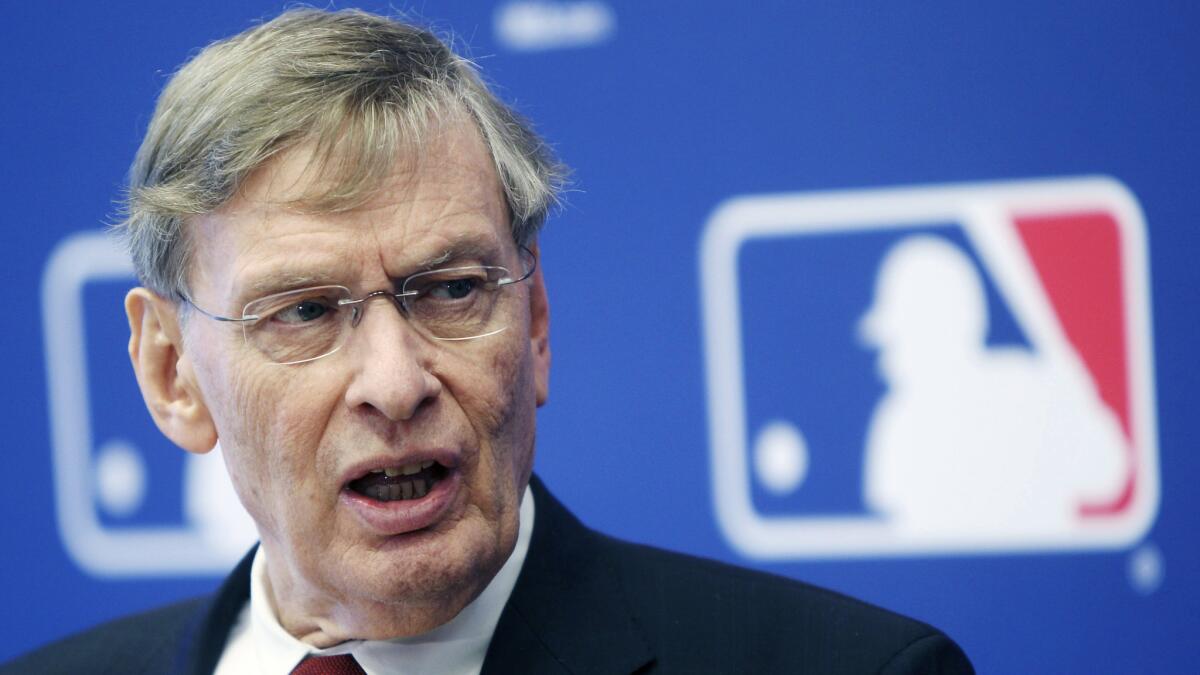Commentary: Hey, Bud Selig, this steroid era is for you

- Share via
In January, Bud Selig mused aloud about a farewell tour for his final season as commissioner. Meet some fans, shake some hands, celebrate the game.
The parting gifts might not all be good. On his way out — so close to the finish line that owners plan to vote on his successor next week — Selig might be stained again with the residue of a drug scandal.
There is no label that stings Selig more than “commissioner of the steroid era,” no phrase he loves to repeat more than “toughest drug-testing program in American sports.” Yet there is no testing program that eradicates drug use, and here we go again.
Tony Bosch has agreed to plead guilty to a conspiracy to distribute testosterone, according to court documents filed Tuesday in a Florida court. Bosch was the founder of Biogenesis, the Florida clinic that lent its name to the scandal that resulted in the suspensions of Alex Rodriguez, Ryan Braun and 11 other players last year.
Bosch was one of seven people with Biogenesis links arrested Tuesday after a two-year investigation dubbed “Operation Strikeout,” federal authorities announced at a news conference. In cooperating with Major League Baseball last year, Bosch told league officials he had given them “all the names he had,” a league official said Tuesday.
Maybe Bosch had not given up the name of every player. Maybe Bosch had distributed steroids to associates who then sold them to players, independent of Bosch. Either way, according to an ESPN report, multiple players not previously linked to Biogenesis were identified in the federal investigation.
If those names are released, the inevitable suspensions could affect the pennant races and the free-agent market. Selig’s last day in office: Jan. 24, 2015. Those five months suddenly got a lot longer.
If new names are coming, the sooner the better. Imagine if the names come out in the fall, and your team falls one game short of a playoff spot, behind a team with a prominent player who does not have to serve his suspension until next year.
“From a players’ perspective,” Angels pitcher C.J. Wilson said, “I don’t want to be playing with anybody that I think is about to be suspended.”
No one pretends that even the latest, toughest penalties — 80 games for a first offense, an entire season for a second offense — can deter every player.
“There are always going to be guys trying to find an edge and take their game to another level,” Dodgers catcher A.J. Ellis said, “weighing the risk and reward.
“The financial rewards in this game are so great that the risk-reward [balance] is there for guys who are willing to step over that line.”
Exhibit A last winter was shortstop Jhonny Peralta, who leads the St. Louis Cardinals with 15 home runs. Peralta was suspended 50 games at the end of last season, when he played for the Detroit Tigers, then signed for four years and $53 million with the Cardinals.
“By and large, he earned that,” Angels closer Huston Street said. “It’s tough to equate how much he was helped and how much he wasn’t helped [by performance-enhancing substances.] That’s a decision made at the baseball level by the GMs and by the owners and by the people that want to win.
“From a players’ perspective, that contract helps other players. From a performance-enhancing perspective, I want it to be a clean sport. But, if you serve your penalty and you serve your suspension, I believe in forgiveness.”
Whatever sense of national outrage existed at steroid use appears to have evaporated, except for the annual Hall of Fame voting debates. Some fans might be convinced baseball has done all it can to clean up the sport. Some fans might not care what players do to their bodies. Some fans might just be tired of it all.
“From a Dodger standpoint, it’s almost like the McCourt saga,” Ellis said. “They’re kind of numb to it. Every time some news breaks, there might be a 24-hour cycle. For the most part, they’re numb and over it.”
Street said the players have toughened the testing program repeatedly, and without insisting owners wait for the collective bargaining agreement to expire.
“From a media perspective, there will always be someone pushing the story,” he said. “From a players’ perspective, I think the league and baseball has done more than its duty.”
Still, if there are more names coming out, Street wants to know.
“I’m thankful for the whole process,” Street said, breaking into a laugh. “I’m a guy throwing 90 mph. I need all the advantages I can get.”
More to Read
Go beyond the scoreboard
Get the latest on L.A.'s teams in the daily Sports Report newsletter.
You may occasionally receive promotional content from the Los Angeles Times.











